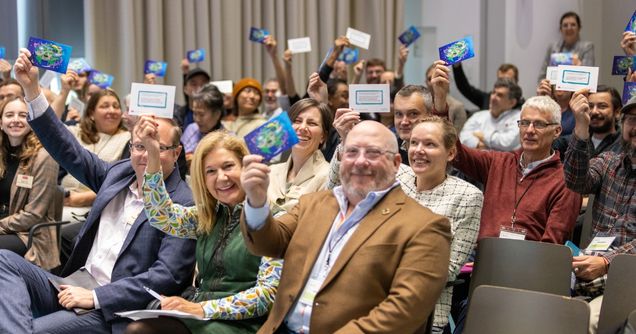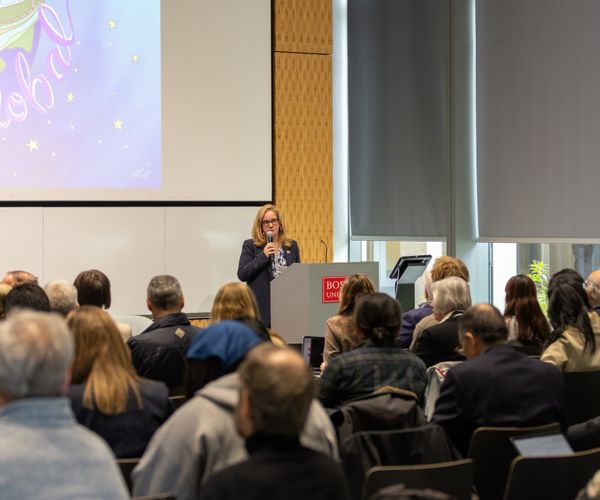By Laura Hurley
The inspiration for this year’s Boston University Institute for Global Sustainability (IGS) annual event theme, “From Local to Global,” is easy to find at Boston University (BU).
Speaking to sustainability and climate researchers across the university at IGS’s annual gathering, BU President Melissa Gilliam recognized BU for leading by example in challenging times and setting “ambitious goals for the sustainability of our campus, our city, and the world.” In her recorded video remarks, she applauded the critical knowledge generation and breakthroughs happening at BU to address the climate crisis, thanks to a strong culture of collaboration across disciplines and leadership in convergent research. Gilliam also congratulated IGS Director Benjamin Sovacool for “further elevating BU’s leadership in global climate science” as IGS’s research presence on the world stage grows through a new research engagement.
BU Leadership for IPCC Climate Science Report
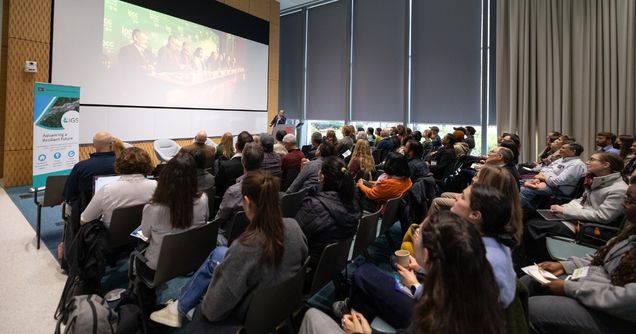
As recently announced by the United Nations’ Intergovernmental Panel on Climate Change (IPCC), Benjamin Sovacool, a professor of earth and environment in the BU College of Arts & Sciences, has been selected to serve in one of the senior-most author roles for the IPCC’s 7th Assessment Report. Only 664 authors were appointed overall from the 3,771 nominees. Published every seven to eight years, the reports are highly influential in international climate discussions—providing policymakers with a non-partisan synthesis of the current scientific, technical, and socio-economic evidence on climate change.
Sovacool is a Coordinating Lead Author (CLA) for Working Group II on Impacts, Adaptation, and Vulnerability, which convenes experts from 90 countries to examine how climate change affects socio-economic and natural systems. He represents the Global North as one of two CLAs providing oversight for the report’s newest Chapter 20, “Poverty, livelihoods, mobility and fragility,” which includes climate-related forced displacement and conflict. Publication is planned for 2028.
Highlighting what makes the IPCC a unique scientific body, Sovacool emphasized its deep interdisciplinarity, saying, “We have climate modelers, atmospheric scientists, physicists, chemists, and biologists alongside sociologists. We have economists, we have political scientists, anthropologists, the whole gamut of disciplines.”
In a separate Q&A about this announcement, Sovacool talks more about his role, the IPCC and its significance, and opportunities for faculty and students at BU to participate.
Sovacool previously contributed to the 6th Assessment Report as a Lead Author for Climate Change 2022: Mitigation of Climate Change.
Spotlight on Global and Local Climate & Sustainability Research
Building on this year’s “From Local to Global” theme in her opening remarks, IGS Executive Director Rebecca Pearl-Martinez said, “The research you are engaged in holds tremendous power in moving science and policy forward on climate and sustainability. Right now, this is particularly true at the local level, and there is even more power if we tackle the climate crisis together across diverse disciplines.”
IGS’s annual gathering brought together BU faculty and project partners working in climate and sustainability for fireside chats to discuss their research priorities and emerging solutions.
Global to local
The first fireside chat, moderated by Pamela Templer (Distinguished Professor and Chair, Biology), took a “global to local” perspective with panelists Patricia Hibberd (Chair and Professor, Global Health), Ayse Coskun (Professor, Electrical & Computer Engineering and Associate Dean for Research and Faculty Development), and Christoph Nolte (Associate Professor, Earth & Environment). Between them, their sustainability research is expansive, including forest ecosystems, biodiversity conservation, energy-efficient computing and data centers, and infectious diseases.
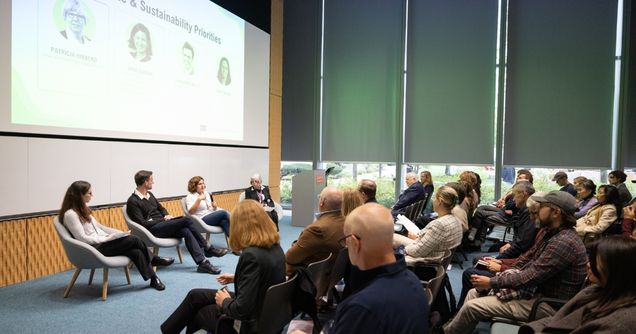
Pamela Templer touched on her climate change study in the Hubbard Brook Experimental Forest and collaborative research on urban tree growth as part of regional projects, as well as efforts to engage students in international environmental diplomacy at the United Nations Climate Change Conference through the Climate Leaders Academy. Christoph Nolte added to this discussion of planetary health, talking about his efforts to better understand the effectiveness and costs of land conservation through land value mapping.
Bringing human health issues to the forefront of the climate conversation, Patricia Hibberd has followed a cohort of 100,000 pregnant women in central India for decades to study the consequences of household air pollution for mothers and babies during pregnancy, labor and delivery, and early childhood. Her work in this area also includes mosquito-borne diseases and extreme heat.
The panel also underscored how global energy concerns have local impacts. Ayse Coskun works on energy efficiency and sustainability in computing, with a major focus on flexing or reducing data center power use on demand as AI usage skyrockets, in addition to studying the socio-environmental impacts as part of BU’s Limits to Digitalization international research collaboration.
To capture global computing’s under-recognized consequences for local sustainability, Coskun said, “You might have done some Amazon shopping this morning, posted something on Instagram, and asked questions to ChatGPT. These are not happening on your devices. So the simplest thing of checking an email is global. And when you do these activities, you don’t necessarily think about what happens to a local place.”
Local to global
The second fireside chat of the event switched focus to “local to global,” featuring BU research initiatives at the city and state levels. Moderator Cutler Cleveland (Professor of Earth & Environment and IGS Associate Director) led the conversation with Melissa Lavinson (Executive Director, Office of Energy Transformation, Massachusetts Executive Office of Energy & Environmental Affairs), Lucy Hutyra (Distinguished Professor and Chair, Earth & Environment), and Eric Gordon (Director of Center for Media Innovation & Social Impact and Professor of the Practice in Journalism).
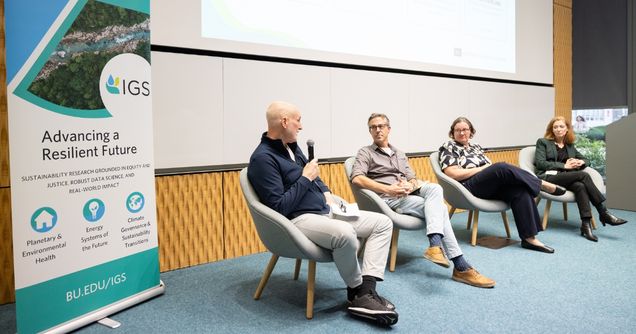
Energy transitions have been transformative throughout human history. As Cutler Cleveland explained, and shows through Visualizing Energy data stories, “Almost any of the major gains in human wellbeing that have occurred over the last several centuries in health and our economic outcomes are connected directly to changes in our energy systems. They’re inextricably linked.”
With the ever-increasing urgency to decarbonize, panelist Melissa Lavinson in the Massachusetts Office of Energy Transformation stressed the importance of thinking about the current clean energy transition in terms of people and involving the various perspectives of stakeholders in the “entirety of the energy ecosystem,” as she described it, to create trust and a common foundation of information and data. Making a significant contribution toward this goal is the Clean Energy and Environment Legacy Transition (CELT) Initiative, a collaboration between the State of Massachusetts, BU, and UMass Lowell to support state agencies and local municipalities with data-driven decision-making, leading to equitable decarbonization across Massachusetts cities and towns.
In the complex, interdisciplinary effort to advance climate solutions, Lucy Hutyra is working to reduce extreme heat in cities as urbanization grows. She discussed her pioneering work to develop local, place-based data models to understand how trees and engineered climate solutions, such as cool roofs, can impact temperatures in specific cities around the globe to help guide decision-making.
Eric Gordon wrapped up the conversation, bringing it full circle back to trust and data in climate action engagement strategies. Gordon takes yet another approach to identifying climate solutions and looking at the role that communication plays in bringing together people from multiple perspectives to participate in climate adaptation efforts through the new BU Center for Media Innovation & Social Impact. In closing, discussing a local project he’s working on, Gordon asked, “How do we give people the same access to analysis that institutions have? Can we do that? Can we democratize analysis through the tools that we have?”
If the research underway at BU is any indication, the answer is a resounding yes.
2025 Sustainability Research and Student Poster Award Winners
Like many superheroes, IGS’s Sustainability Research Award and Student Poster Competition winners wear capes. Green capes, of course. Congratulations to this year’s winners!
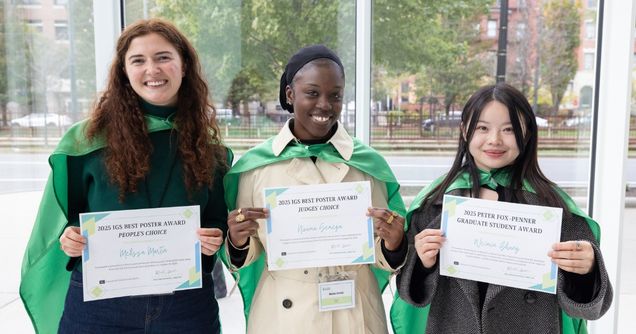
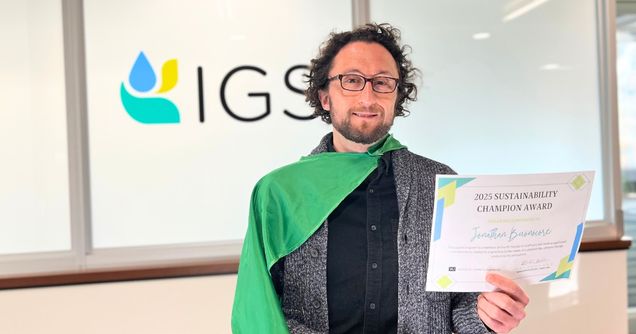
The annual IGS Sustainability Research Awards, now in their fourth year, celebrate the exceptional achievements of faculty and students who are nominated by the BU community for advancing a more sustainable, just, and climate-resilient future.
- 2025 IGS Sustainability Champion Faculty Award: Jonathan Buonocore, Assistant Professor, Environmental Health, School of Public Health
Buonocore is honored for his highly cited, impact-driven research at the intersection of energy systems, climate, and health, offering policy-relevant insights in partnership with non-governmental organizations. As an IGS core faculty member, he is making significant contributions to healthy and just energy transitions through his research into community exposures to energy infrastructure as part of the Clean Energy and Environment Legacy Transition (CELT) Initiative and the Energy & Equity Exposures Database for Population Health project.
- 2025 IGS Peter Fox-Penner Graduate Student Award: Weimin Zhang, PhD Candidate, Earth & Environment, College of Arts & Sciences
Zhang is recognized for her rigorous qualitative research assessing the effectiveness of energy and decarbonization policies worldwide, providing actionable insights for designing equitable and sustainable decarbonization pathways. Additionally, she recently published her first lead-author paper, The “Triple Burden” Effect and “Pressure-Opportunity Paradox” of Net-Zero Transitions: Exploring the Political Economy of Carbon Border Adjustment Mechanism Implementation in the Global South, in the top-tier energy studies journal Energy Strategy Reviews.
Students from across BU also showcased their sustainability and climate research in IGS’s “Best Poster” Awards competition at the event, representing the departments of Earth & Environment in the College of Arts & Sciences, Environmental Health in the School of Public Health, Emerging Media Studies in the College of Communication, Finance in the Questrom School of Business, and Materials Science & Engineering in the College of Engineering.
Two students received “Best Poster” awards for their excellence in research and presentation.
- 2025 Judges’ Choice Student Poster Award: Niouma Semega, PhD student, Environmental Health, School of Public Health, for the research poster “Characterizing Indoor Air Pollution from Gas Stoves: Baseline Data from City of Boston’s Decarbonization Pilot” (PDF)
- 2025 People’s Choice Student Poster Award: Melissa Martin, PhD student, Earth & Environment, College of Arts & Sciences, for the research poster “Cool Cities, Local Contexts: A Typology of Urban Heat Interventions across Disciplines” (PDF)
To celebrate the potential of the efforts underway at BU, IGS also commissioned student artwork for the event to inspire everyone to think about how they can advance sustainability and climate research and policy at the local or global levels. The artist, Sophia Tigges, is a PhD candidate in the department of Earth & Environment and a 2025 IGS Graduate Student Summer Fellow.
